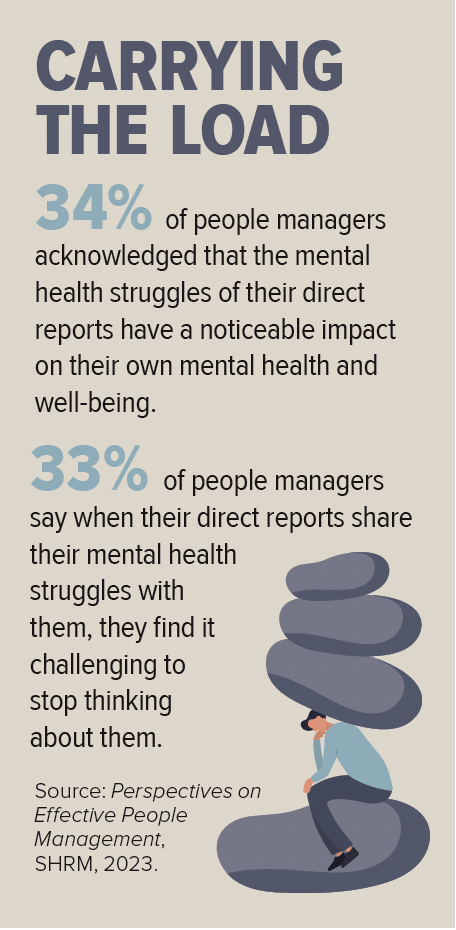Another Challenge for People Managers
Managers play an important role in supporting the mental health of their teams, and this added responsibility can take a significant toll.
While inflation may have been the top concern for organizations in 2023, SHRM research reveals that another critical concern emerged as a close second: employee mental health and well-being. As organizations grappled with the complexities of a challenging economic landscape, they simultaneously sought to support workers struggling with hard times. In their quest, organizations turned their attention to a vital asset: people managers.

Gone are the days when managers were solely taskmasters or productivity enhancers. Today, managers play a significant role in mental health support, having become even more influential than health care professionals such as therapists and doctors and mirroring the influence of spouses and partners, according to research by UKG.
This finding, while compelling, is not entirely surprising, given both the significant amount of time employees spend with their managers, and managers’ influence on crucial resources, time off, recognition, career advancement and job security. SHRM research shows that managers can also foster a sense of connection, community and growth, which are the top drivers of U.S. workers’ overall mental health.
However, as organizations turn to managers as first responders for mental health support, there are implications to be aware of. Only 5 percent of organizations provide managers with training on mental health issues, according to SHRM’s 2022 Mental Health and Belonging report, leaving them ill-prepared to support employees while maintaining their own well-being.
The very qualities that organizations and employees value in managers—such as empathy, a strong sense of responsibility for their team and a collaborative style—may make them especially vulnerable to the emotional toll exacted by supporting their direct reports who have mental health struggles. Recent SHRM research (Perspectives on Effective People Management, 2023) brings this into focus, as 34 percent of people managers acknowledged that the mental health struggles of their direct reports have a noticeable impact on their own mental health and well-being. Moreover, once they know about a direct report’s mental health challenges, 33 percent of managers find it hard to stop thinking about them.
The implications also extend into the realm of stress. That same SHRM research showed that a noteworthy 27 percent of people managers feel significant stress when their direct reports share their mental health struggles with them. This is a notable concern, considering that 58 percent of people managers frequently experience high levels of stress in their job.
Managers already bear much responsibility for supporting and leading their teams. If they are to take on this additional duty, it’s essential for employers to provide managers with the necessary resources—the SHRM Mental Health Ally Certificate, for example—and support to help them navigate that added responsibility. As organizations embark on initiatives to enhance employee mental health and well-being, it becomes increasingly apparent that the well-being of managers is an integral component of this equation.
Ragan Decker, Ph.D., is an industrial-organizational psychologist and manager of commercial research at SHRM.
Advertisement
An organization run by AI is not a futuristic concept. Such technology is already a part of many workplaces and will continue to shape the labor market and HR. Here's how employers and employees can successfully manage generative AI and other AI-powered systems.
Advertisement


